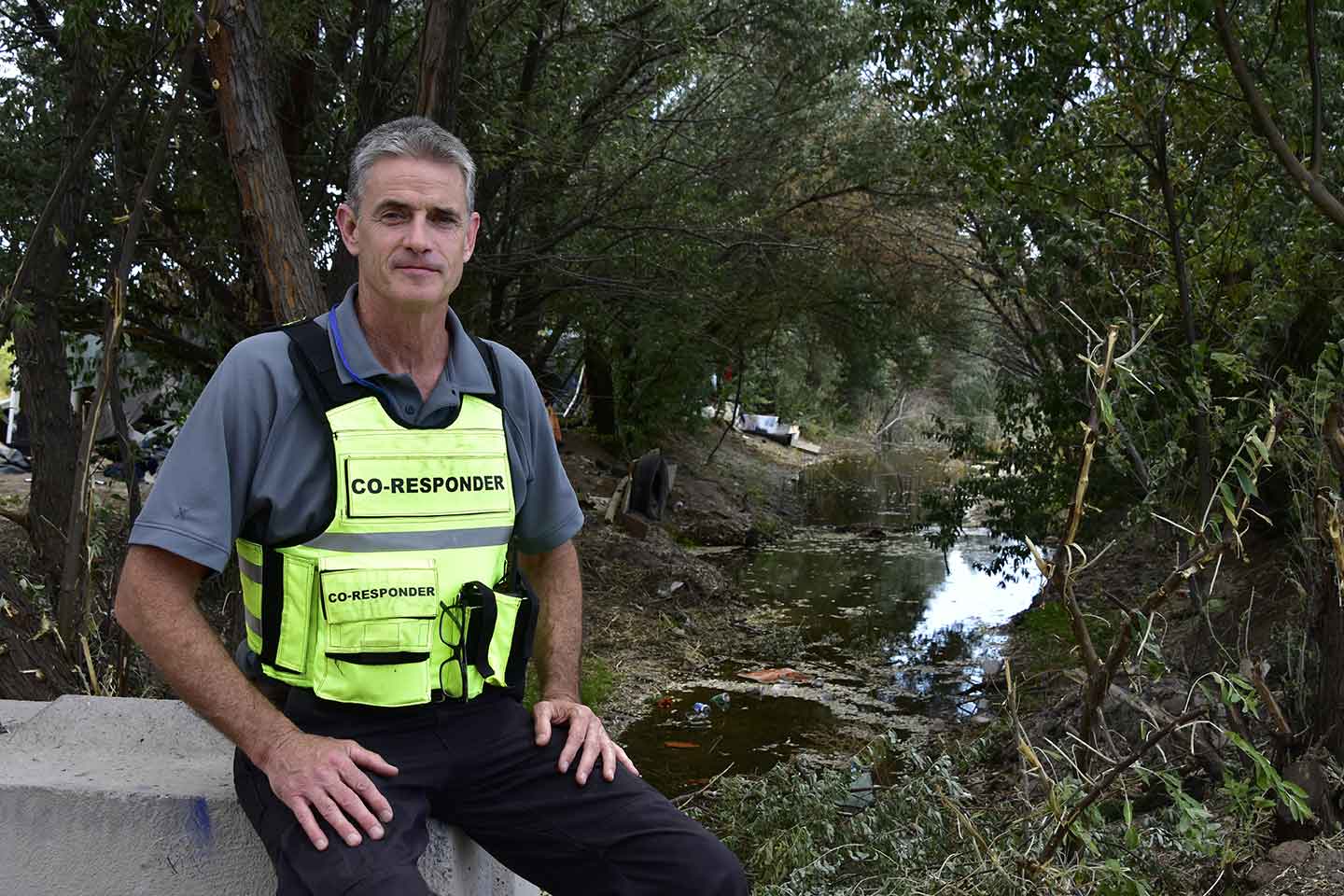
Tim Dellett, a co-responder with the City of Alamosa, at the St. Benedict sanctioned campsite on Aug. 21, 2023. Photos by John McEvoy / Special to The Colorado Trust
Tim Dellett, a co-responder with the City of Alamosa, at the St. Benedict sanctioned campsite on Aug. 21, 2023. Photos by John McEvoy / Special to The Colorado Trust
St. Benedict is a sanctioned campsite in Alamosa, a city of about 10,000 in Colorado’s San Luis Valley. On any given day, there are close to 50 people experiencing homelessness who are staying at the campsite. In addition to affordable and stable housing, many of them need mental health care, substance use treatment or other assistance.
To better help people with mental and behavioral health needs (and not rely solely on police officers to provide such support), the city launched a co-responder program in 2022 with the help of state funding. Co-responder programs typically pair clinicians with law enforcement on behavioral health-related calls. Rural locales like Alamosa have begun adopting such approaches in recent years.
Alamosa is also now one of four locations in Colorado participating in a pilot for the Law Enforcement Assisted Diversion program, receiving annual funding to try to “improve public health and to end the cycle of recidivism.” After an arrest, rather than a traditional path through the justice system, a person may be referred to a case manager to try and address their needs, such as providing stable housing or enrolling them in substance use treatment.
Alamosa City Manager Heather Sanchez says both programs were a significant shift for local law enforcement.
“The police officers don’t always know the language of behavioral health, and the person in question could get bounced around between different services and not get the situation properly taken care of,” Sanchez says. “We started looking at those mental health components as an important need in the community, and the police chief was very proactive in evaluating that.”
Tim Dellett was Alamosa’s first co-responder, hired in August 2022. His colleague Connie Brydges was hired the following year.
“When we decided to create the co-responder program, we knew we needed to find the right individual,” Sanchez says. “There’s a certain personality that’s going to fit within the police department and yet be a mental health professional and be able to interact with a wide variety of people.”
Mental health professionals are difficult to identify and hire, especially in rural areas. Sanchez says the hirings of Dellett and Brydges were like “lightning in a bottle.”
The co-responders and others allowed me to accompany them during their visits to St. Benedict in late 2023 and early 2024. For many months, the co-responders made near-daily visits to St. Benedict, as the intersecting needs of the people staying there are significant; aside from a lack of affordable housing, many studies have found a link between poor mental health and the risk of being or becoming unhoused. However, because of the pervasive need for mental health support in the area, their work is taking them farther and farther afield these days, and less and less at the campsite.
All of the people interviewed and photographed below agreed to share their stories.
* * *
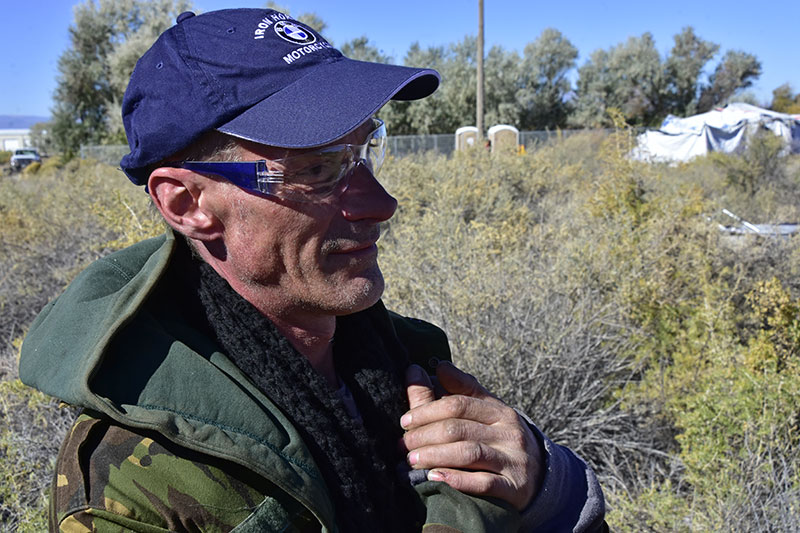
Eric Kohlmetz’s daughter died in March 2022 from a drug overdose. He felt he had to do something to escape and take his mind off it.
“I bought property in Costilla County after people told me that 10 acres were cheap,” Kohlmetz says. “I was wondering, you know, what’s the catch? Well, the catch is it’s easier to build a house on the moon.”
Kohlmetz encountered cost and regulatory hurdles with the property’s water cistern and septic system and had to sell it. He still dreams of building his own home.
“My goal is to create a company doing renovations or property management and to have an opiate clinic and name it after my daughter so that she can have a little bit of the legacy that was taken from her,” he says.
During his stay at St. Benedict, Kohlmetz has begun attending city council meetings, reading up on municipal codes and advocating for better conditions at the campsite. (For example, there were previously no designated parking spaces at St. Benedict, but the city has since added some.) Kohlmetz also tries to help other campsite residents find employment, often passing out printouts of job listings from the local workforce readiness center.

The sounds of a woman weeping inside a tent at St. Benedict spurs Dellett and Brydges to approach and cautiously ask if she is okay. A man exits the tent, visibly distraught, and explains that his partner had a contact lens stuck under her eyelid and could not dislodge it. Brydges offers to go to the pharmacy and get her some eyewash, and the woman agrees.
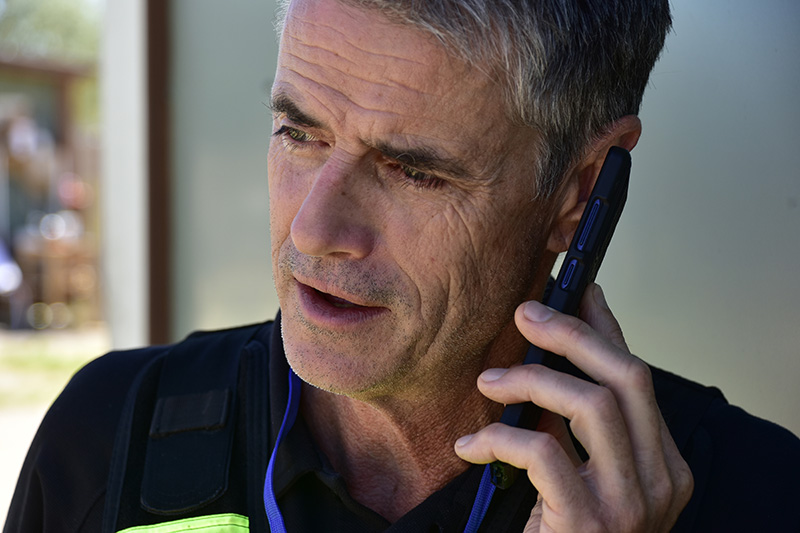
Tim Dellett received a master’s degree in counseling from Adams State University and has worked at nonprofits in Alamosa since 1998.
In addition to addressing needs on the spot when possible, the co-responders also offer advice on where people can apply for assistance in obtaining better shelter, clothing, food, health care, substance abuse treatment and employment. However, Dellett says that campsite residents do not always accept his help or resources.
“The most challenging part is there’s clearly a lot of need here for the services that we can provide to help people,” he says. “You would think that folks would just be lining up, but that’s just not the case—a lot of folks are stuck in addiction.”
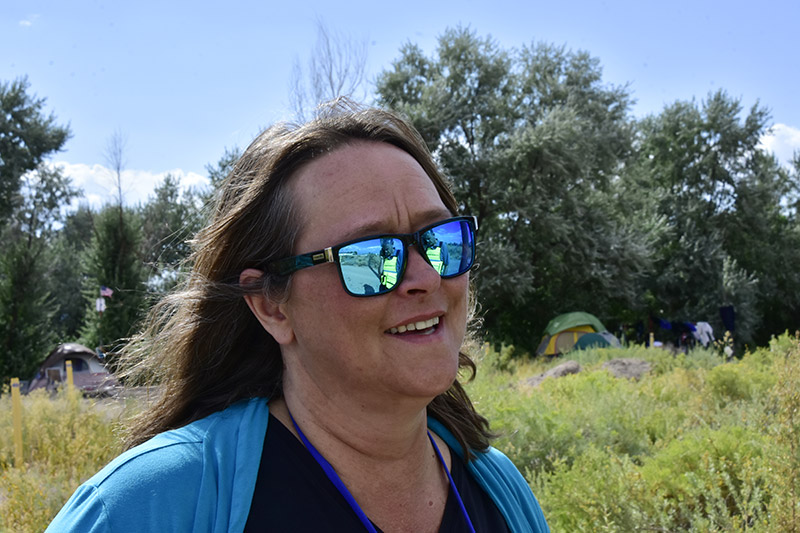
Connie Brydges has a master’s degree in community mental health. She worked at Alamosa Crisis Services for three years, then moved to Trinidad to work as a social worker, counselor and supervisor in crisis intervention and correctional facility positions, and then returned to the San Luis Valley. She also teaches psychology and sociology classes at Trinidad State College.
“It kind of fits in with my belief system,” Brydges says of her co-responder role. “I’m very much about treating people and not filtering people into jails and prisons and trying to help them get mental health and substance use treatment.”
The regular presence of Dellett and Brydges at St. Benedict is noticed and appreciated. “I think they are nice and very helpful,” says Heather Ray, one of the people staying at the campsite. “But some of us here think they are like Jehovah’s Witnesses, the way they come around all the time to check on us.”
“More like Girl Scouts selling cookies,” quips Brydges.
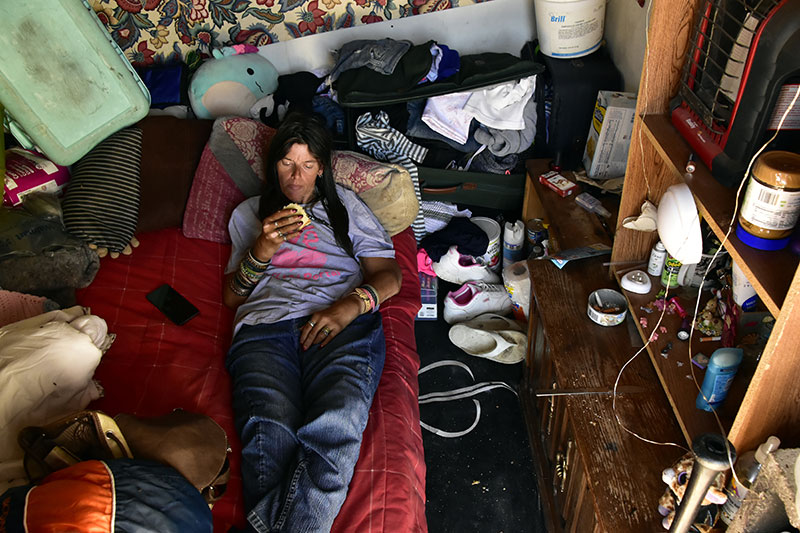
Karen Smith was diagnosed with multiple sclerosis when she was 20 years old. She is now 47.
“I don’t take any medication because initially, it made me sick and caused me to have a flare-up,” Smith says. “Forget that. I’m not doing it.”
The three port-a-potties at St. Benedict are about 100 yards from where Smith had been staying in a semi-permanent hut. She relies on a wheelchair to get around.
“People know who I am here and are pretty helpful when I need it,” Smith says.
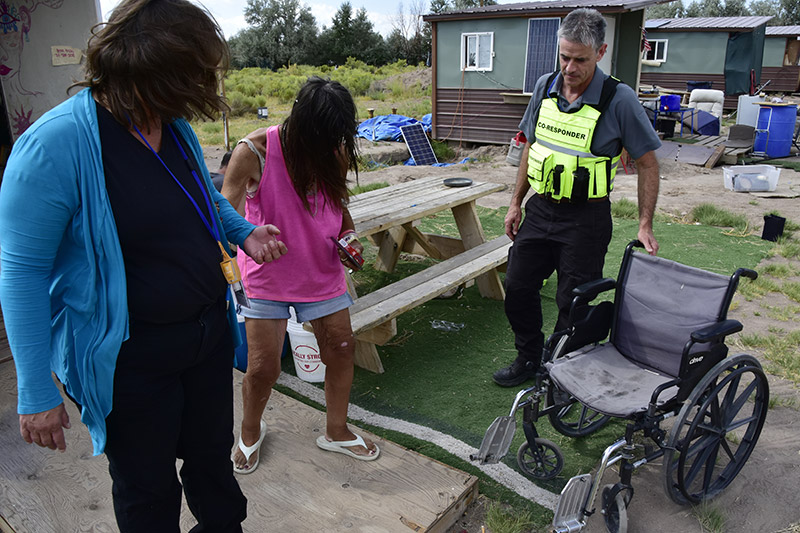
Brydges (l.) assists Smith to her wheelchair on a fall day in 2023. Smith was recently moved to an assisted living facility nearby. Brydges visited Smith there; “Karen was smiling like never before and watching the Hallmark Channel,” Brydges says.
Finding Smith a spot at the facility took time. “That’s been a whole community effort working to get that done because it’s tough,” Brydges says. “The people that seem to need it the most are often the ones that are hardest to find help for.”
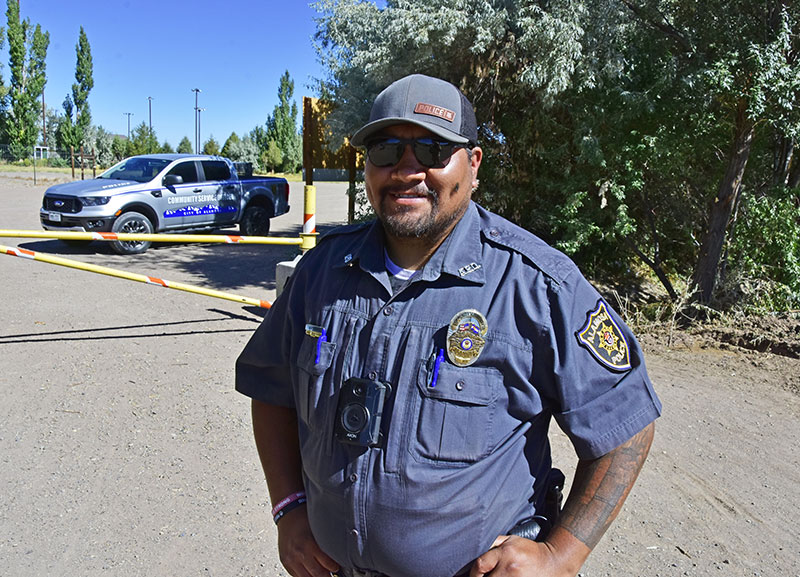
Mario Linares is a parole officer with the Alamosa Police Department. He makes rounds at St. Benedict to ensure that dogs are leashed, trash is being removed, and people are being courteous to one another.
“Mainly, it’s open-flame fires that we deal with, and then all the trash they have and buildings they’re constructing, which aren’t allowed because it’s not a permanent location. It’s a temporary place for them to try to get on their feet and move on from here,” he says.
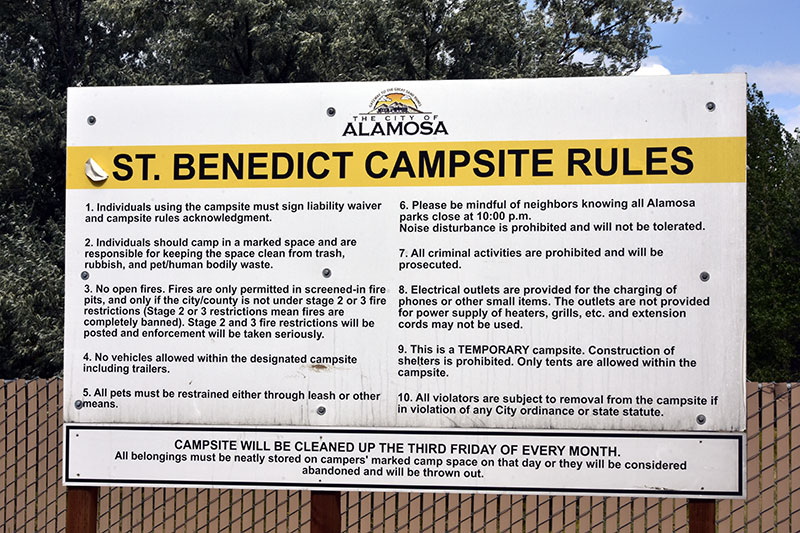
Rules are listed on a large signboard at the St. Benedict campsite.
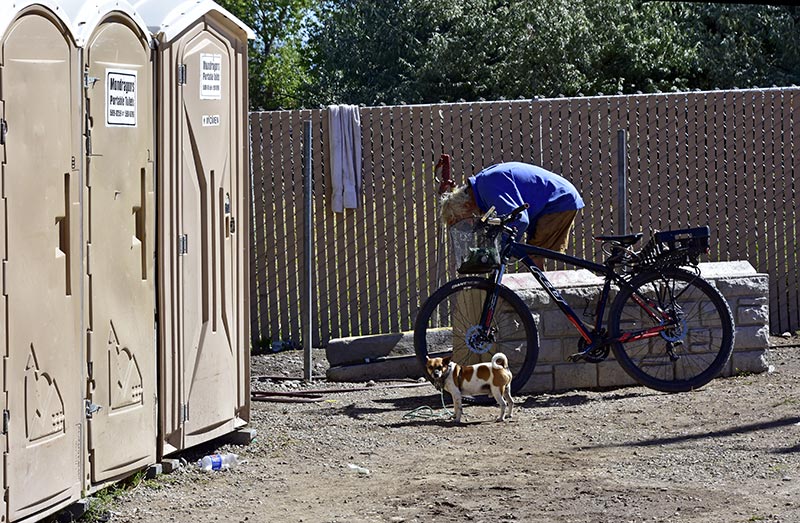
A person living at St. Benedict washes up at a spigot that serves as the water source at the campsite. The three adjacent port-a-potty stalls include a toilet for men, a toilet for women and a cold-water shower from a hose hung from the ceiling.
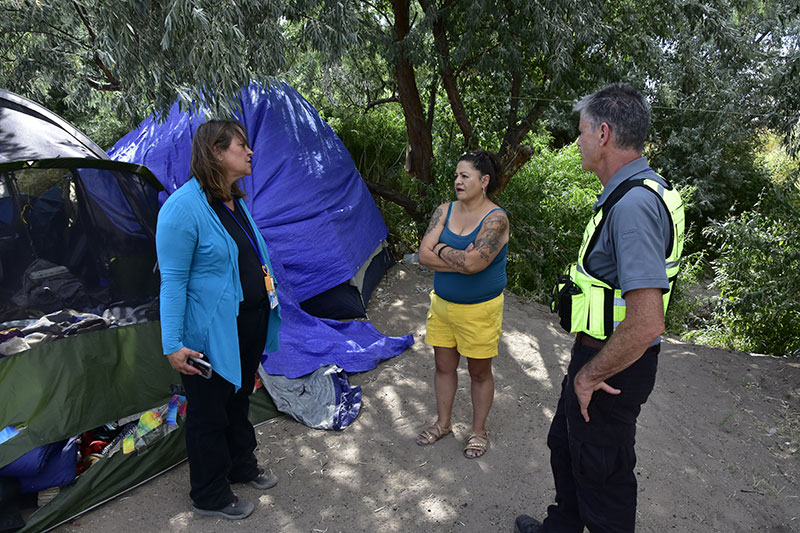
Hearing a woman repeatedly calling out while on their rounds at St. Benedict, Brydges and Dellett find Melinda DeHerrera searching for her friend, whom she thought was at the camp. DeHerrera says she is living out of her truck and looking for work. She says she had used heroin in the past but has been clean for a few weeks. Brydges gives her a business card and tells her to call when she can and that they will try to find help for her.
“We have to address all these problems from many different angles, and that’s what the co-responder program does,” Dellett says. “We’re not law enforcement. We’re all about getting people into treatment, helping them move forward in positive ways and helping to calm things down.”
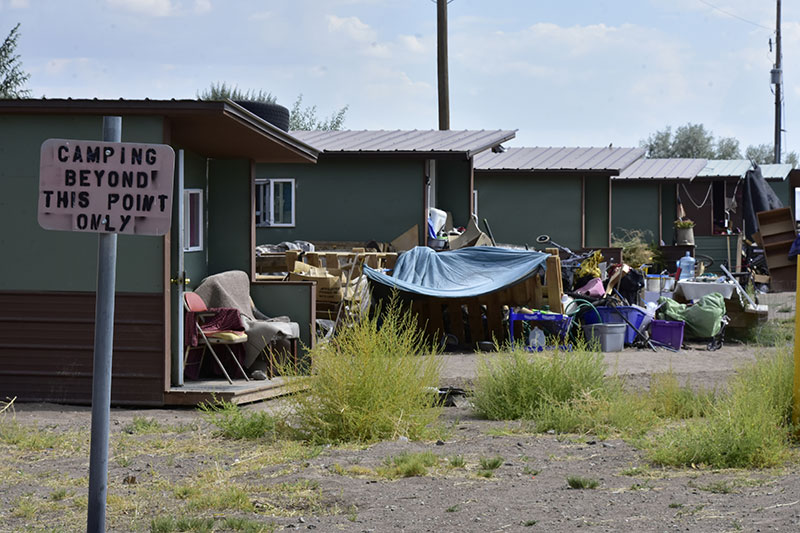
In addition to tents, the St. Benedict encampment previously included several huts (pictured) that were intended to serve as transitional housing. (Smith lived in one before relocating to the care facility.) However, in April 2024, the city demolished the structures. There had been numerous complaints about bullying, intimidation and retribution among campsite residents over who had the right to stay in a hut.
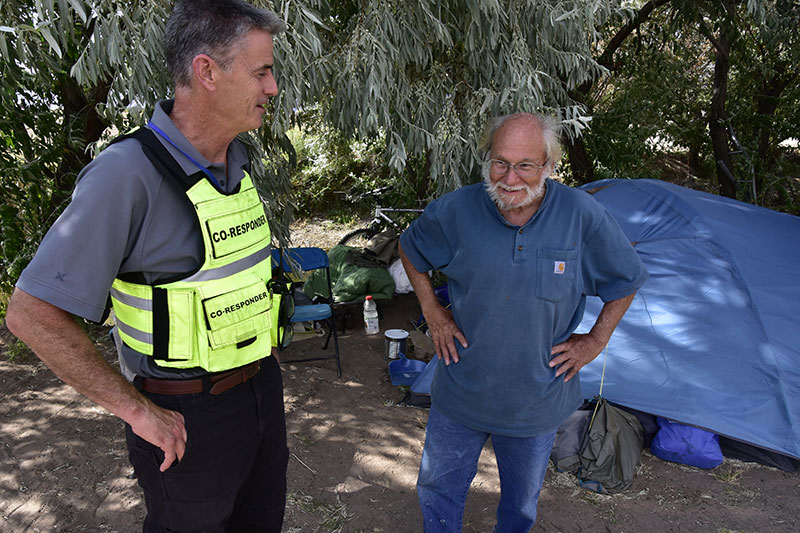
Dellett chats with William Mendez during a visit to St. Benedict. Mendez previously worked in conservation services and landscape mapping for agencies like the Bureau of Land Management, the U.S. Forest Service and the Natural Resources Conservation Service. He also performed similar work in Africa before attending graduate school in Oregon.
“I lived in Oregon for about 14 years before I moved here to get a promotion and a raise,” Mendez says. “You have to move around a lot to go where the work is.”
Mendez has worked in the San Luis Valley, Trinidad and Las Animas County over the last 35 years. He’s become homeless on three occasions—always because of the loss of a job.
“The lack of affordable housing… has caught up to Alamosa now,” Mendez says. “It doesn’t take very much to end up in a place like this.”
Mendez believes Alamosa is fortunate to have the St. Benedict campsite. “It is well organized, and it’s not too bad—a little rough around the edges, but these places always are.”